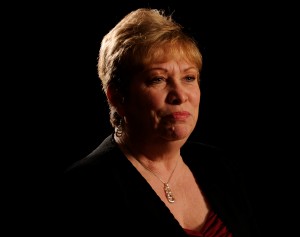Measures to help small firms in Chancellor George Osborne’s Budget this afternoon were immediately welcomed by Bath’s business community and business advisors.
Phil Smith, pictured right, managing director of Business West – the organisation that runs the Bath Chamber of Commerc e - said the Chancellor had delivered what will be remembered as a “thin but business-pleasing” Budget. Permanent savings in business rates would be applauded by thousands of small firms across the South West, he said.
e - said the Chancellor had delivered what will be remembered as a “thin but business-pleasing” Budget. Permanent savings in business rates would be applauded by thousands of small firms across the South West, he said.
“We also saw further cuts to Corporation and Capital Gains Tax rates, a freeze in fuel duty and a devolution deal worth £900m to the West of England region,” he added.
“Fears of a potential hike in taxes were unfounded and businesses will breathe a sigh of relief. However there is some worry around the downgrades of forecasts to UK economic growth and productivity, which raises some concerns about our medium term economic health.”
CBI South Wes t director Deborah Waddell, pictured left, was encouraged by the devolution deal for the West of England.
t director Deborah Waddell, pictured left, was encouraged by the devolution deal for the West of England.
She said: “As one of the most productive economic areas outside of London, this deal can build on the area’s strengths in advanced engineering, tech, digital and professional services by improving skills provision as well as physical and digital infrastructure.
“We’re particularly pleased that the National Infrastructure Commission will look include the South West in its 5G review.
“It is vital that local leaders work closely with the business community to make the most of this opportunity.”
Julian Cockwell, pictured right, head of tax for the South West at accountancy group KPMG, also highlighted the attention the Chancellor gave to the region.
“With the success of business in the South West previously hindered thanks to our infrastructure, businesses will be rejoicing at the announcement that Severn Bridge toll crossings are to be halved by 2018,” he said.
“While the announcement brought about laughs from the floor, estimates show that the tolls currently cost the South and West up to £100m in lost trade. The region’s businesses will also benefit from faster internet, with the promise of a £14.5m grant for ultrafast broadband.
“Our SMEs will welcome the announcement of lower stamp duty and corporation tax and double the business relief rate for small firms. Better still, the increase in the personal tax allowance and no movement on rumoured cuts to Entrepreneurs’ Relief, will help offset the abolition of dividend relief, incentivising small enterprises in the region to keep growing.”
 Ann Carlton, pictured left, director of private client based in regional law firm Thrings’ Bath office, said businesses would welcome certain measures, “not least the 600,000 which are being taken out of business rates, the 250,000 which will pay less in business rates and the nine out of 10 which will pay less stamp duty or remain unaffected due to the ‘slicing’ effect of the rates bringing these in line with the residential property regime”.
Ann Carlton, pictured left, director of private client based in regional law firm Thrings’ Bath office, said businesses would welcome certain measures, “not least the 600,000 which are being taken out of business rates, the 250,000 which will pay less in business rates and the nine out of 10 which will pay less stamp duty or remain unaffected due to the ‘slicing’ effect of the rates bringing these in line with the residential property regime”.
She added: “These new rates apply from midnight tonight with transitional provisions where contracts have already been exchanged but completion has not taken place. But while this Budget initially looks promising for small businesses, much scrutiny of the small print will be needed.”
However, she said: “Many will view this as a Budget which was driven towards the UK staying in Europe, with Mr Osborne stating that the outlook for the UK economy would be worse if Britain voted to leave the EU and warning that a Brexit could have a negative impact on business activity and confidence.”
Roger Jones, pictured right, managing director of Bath Ales – which produces 20,000 barrels annually and has its own bottling plant and brewery shop at Warmley – dismissed the Budget as a “lot of froth and not enough body”. 
“I’m not sure there’s much in this for the team at Bath Ales or our customers,” he said. “Beer duty hasn’t increased but it’s not enough. We’re still not on a level playing field with cider on duty. The freeze is not enough to benefit consumers and I think the Chancellor should be doing more to champion the British brewing industry.
“Freezes on fuel duty and cuts to Corporation Tax are small steps to help businesses like ours, though bigger steps are needed to support businesses that have lots of employees in very different roles.”
Jon Miles, pictured below left, tax director at Bath accountants Richardson Swift, said the further cut in Corporation Tax rates to 17% in 2020 was potentially good news for profitable businesses, especially those that retain and reinvest a sizeable proportion of their profits.
“However, 2020 is some way off,” he said. “Also, for losses incurred on or after April 1, 2017, companies should be able to use carried-forward trading losses against profits from other income streams or within a group.
“These are currently only available against future trading profits. This may not have a major impact on the average small business, but it may be welcomed by those that have other income such as from interest or property.”
Paul Verwoert, managing director of  Corsham-based Hartsfield Financial Services, said the Chancellor had clearly made an effort to make his Budget appeal to small businesses.
Corsham-based Hartsfield Financial Services, said the Chancellor had clearly made an effort to make his Budget appeal to small businesses.
“The increases announced to rate relief allowances should mean that 600,000 of the smallest companies won’t have to pay business rates. This should save £6,000 per annum on average; plus the £2,000 Employment Allowance will increase to £3,000 from April 2016, reducing the cost of employer National Insurance contributions,” he said.
“We would like to have seen a reduction in red-tape, but overall if you add in the drop in corporation tax, a reduction in commercial property stamp duty for some smaller businesses, and a reduction in capital gains tax, it’s good news.”
Paul added that the lifetime ISA was an “interesting twist”, and the increases in personal allowance and the ISA investment limit were good news for individuals.
“We see this as a ‘not really offending anyone’ Budget, but warmly welcome the recognition it offers for Britain’s ‘Nation of Shopkeepers’,” he said. “The early mention of ‘lower taxes on business and enterprise’ certainly set the tone for the rest of George Osborne’s speech.” 
Gareth Rees, pictured right, partner at Bath-based Epoch Wealth Management, welcomed the taxation changes. “A cut in Capital Gains Tax will undoubtedly help the proliferation of amateur property developers in Bath and the surrounding area although I suspect it will be a great headline for not a huge sacrifice in tax take,” he said.
“Needless to say a cut in Corporation Tax by 2020 will help but I haven’t looked at whether this is offset by a rise in other areas.”
 However, tax director in accountants Grant Thornton’s regiional office, Jenny Batchelor, pictured left, said many of the business-friendly measures announced by the Chancellor had made the tax system even more complex.
However, tax director in accountants Grant Thornton’s regiional office, Jenny Batchelor, pictured left, said many of the business-friendly measures announced by the Chancellor had made the tax system even more complex.
“Although aimed at benefitting business, a lot of these will require more rules and regulations,” she said. “Radical simplification and greater transparency and understanding would increase productivity and compliance – a win-win for the economy and society more wholly.
“Complexity has serious commercial implications for business. We know, for instance, that more than half of businesses say the current tax system slows down commercial decisions – with mid-sized businesses the most affected by this. It’s therefore disappointing that the Chancellor did not use today’s opportunity to push for real and material change to simplify the system.”
There was relief at one measure the Chancellor did not include in the Budget – devolving Air Passenger Duty to Wales. West of England business leaders had been concerned that such a move would have allowed Cardiff Airport to scrap the duty and use that to attempt to lure passengers and airlines away from Bristol Airport.
Bristol Chamber of Commerce and Initiative chief executive James Durie, pictured below, said: “We are pleased that the Chancellor has listened to the business voices from right across the South West. 
“We have been expressing concern that this move would have impacted negatively on our regional airports, in particular Bristol Airport, and potentially reduce our connectivity with global markets.
“We seek measures that will make the South West and indeed the whole of the UK more successful, not ones that change the economic playing field and just transfer existing activity across boundaries. Together with our chamber of commerce colleagues from right across the South West, we wrote to George Osborne asking him not to push through with this change, and we are very glad he has listened.”



















